Signing ceremony of the intersectoral cooperation mechanism for domestic violence
Date:
On 21 June, the ceremony of signing the order on the intersectoral cooperation mechanism for domestic violence took place in Chisinau. The order was signed by the representatives of the Ministry of Labour and Social Protection, the Ministry of Justice, the Ministry of Foreign Affairs, the Ministry of Health, and the National Council for State Guaranteed Legal Aid. The event was organized by the Ministry of Labour and Social Protection of the Republic of Moldova and Women’s Law Center, in collaboration with UN Women and with financial support from Sweden.
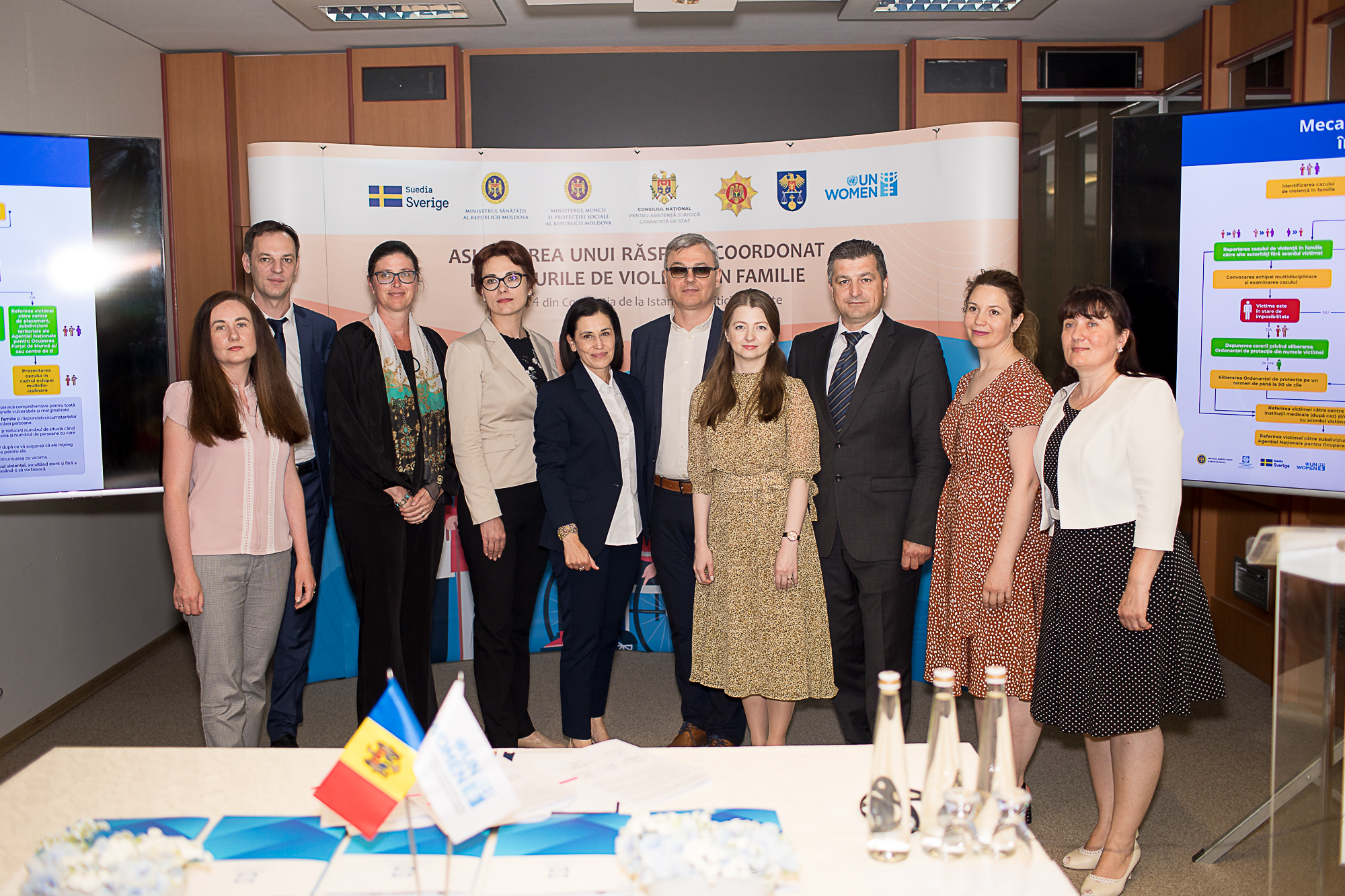
Photo Credit: Stela Dontu/ UN Women Moldova
Violence is a complex social problem with multiple causes and consequences on individual, family, and community levels. Because of the long-standing power inequality between men and women, there is now much more attention being paid to women who are victims of domestic abuse. According to the statistics provided by Moldovan Police, in 2020, there were 38 cases of domestic violence with severe injuries, out of which 15 cases led to the death of the victims (link).
The intersectoral cooperation mechanism has been developed, consulted, revised, and piloted during 2018-2021, in the context of combating the phenomenon of domestic violence. Its main goal is to increase the efficiency of the intersectoral cooperation process between institutions with competencies specified in the instruction, in order to ensure protection and safety, also for achieving the rights of victims of domestic violence and streamlining the monitoring mechanism of family aggressors.
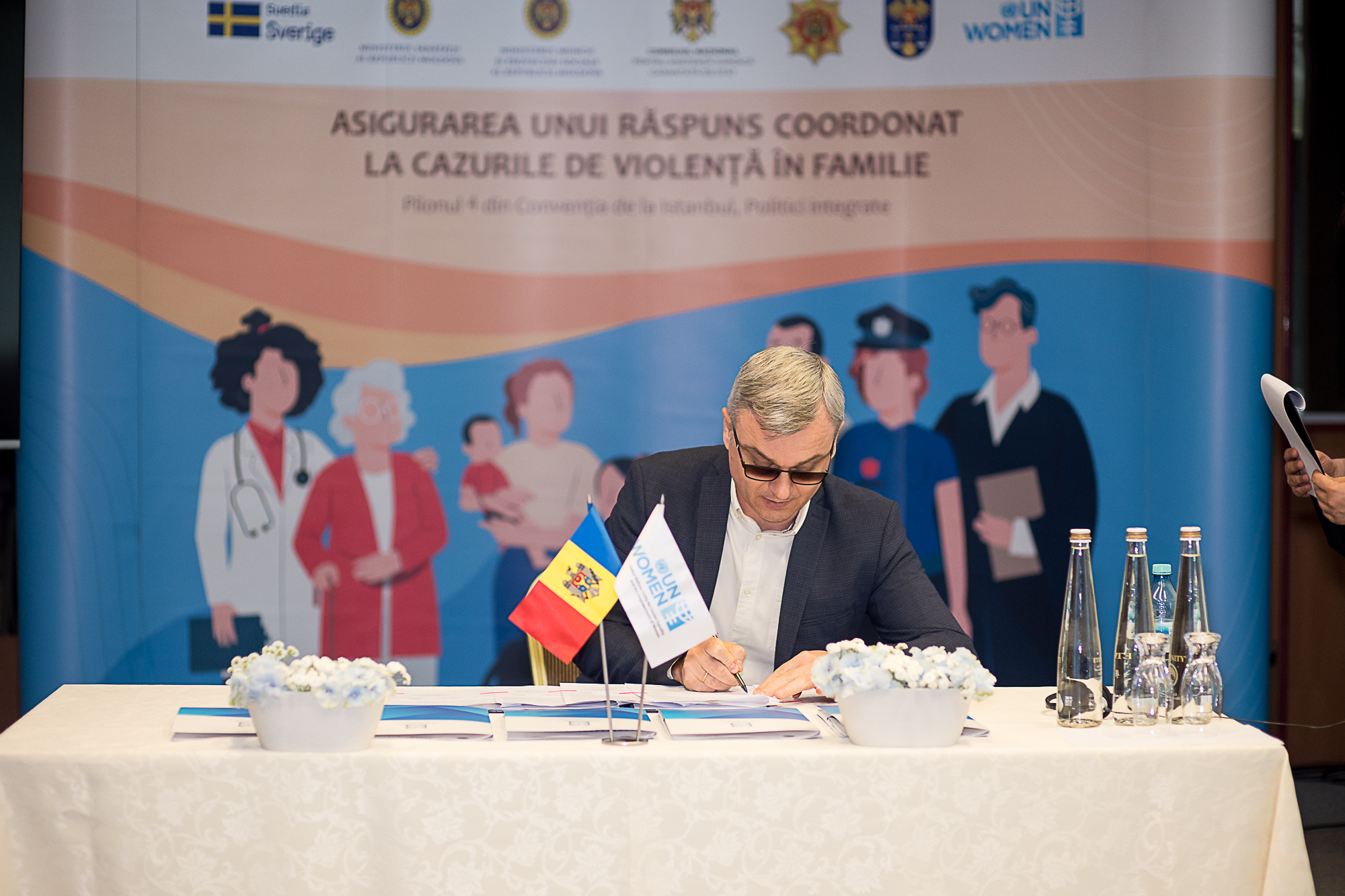
Photo credit: Stela Dontu/ UN Women Moldova
The importance of the signature of this order was highlighted by Vasile Cusca, state secretary of the Ministry of Labour and Social Protection, referring to the contributions to be made by each institution involved. „The ratification of the Istanbul Convention, in October 2021, represented an important step made by our country towards combating violence against women and domestic violence in the Republic of Moldova. But the hard, dedicated work is just about to start. In this context, the mission of the public authorities is to develop necessary policies, documents, and laws, thus ensuring cooperation in terms of preventing domestic violence and providing assistance to victims.”
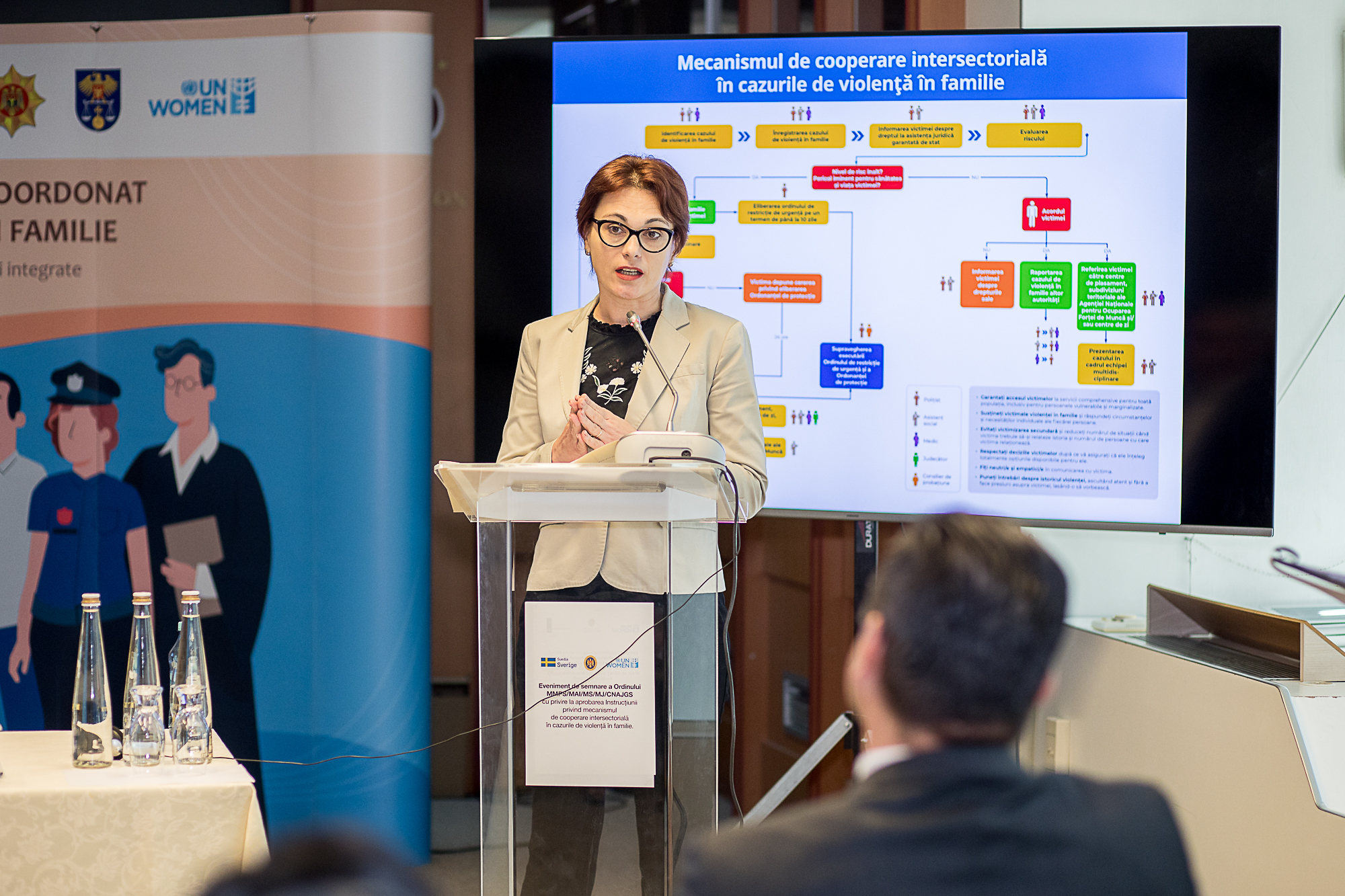
Photo Credit: Stela Dontu/ UN Women Moldova
Daniela Misail-Nichitin, state secretary of the Ministry of Internal Affairs, outlined the priorities of central authorities to be developed and monitored. „The intersectoral mechanism is aiming at helping us in operationalizing the provisions that already exist in the national legal framework of the Republic of Moldova, but also in guiding from central level the following aspects targeting women and children suffering from domestic violence:
- Diversification of the access to services provided to victims and identifying the categories of people who need assistance;
- Assessing the scenarios, we will have to go through when dealing with major risks;
- Providing state-guaranteed legal aid at all levels;
- Providing a prompt and efficient response to the phenomenon of domestic violence;
- Providing a systemic approach in terms of economic empowerment of victims of domestic violence.”
„The intersectoral cooperation mechanism will provide an efficient collaboration between institutions and competent services in terms of ensuring protection, safety, and achieving rights of victims of domestic violence. Clear and transparent communication between institutions will facilitate early identification of cases of domestic violence, providing early medical and socio-medical assistance, thus, preventing repeated victimization and worsening of physical and mental health, especially for vulnerable groups, such as children, elderly, and women”, mentioned Ion Prisacaru, state secretary of the Ministry of Health.
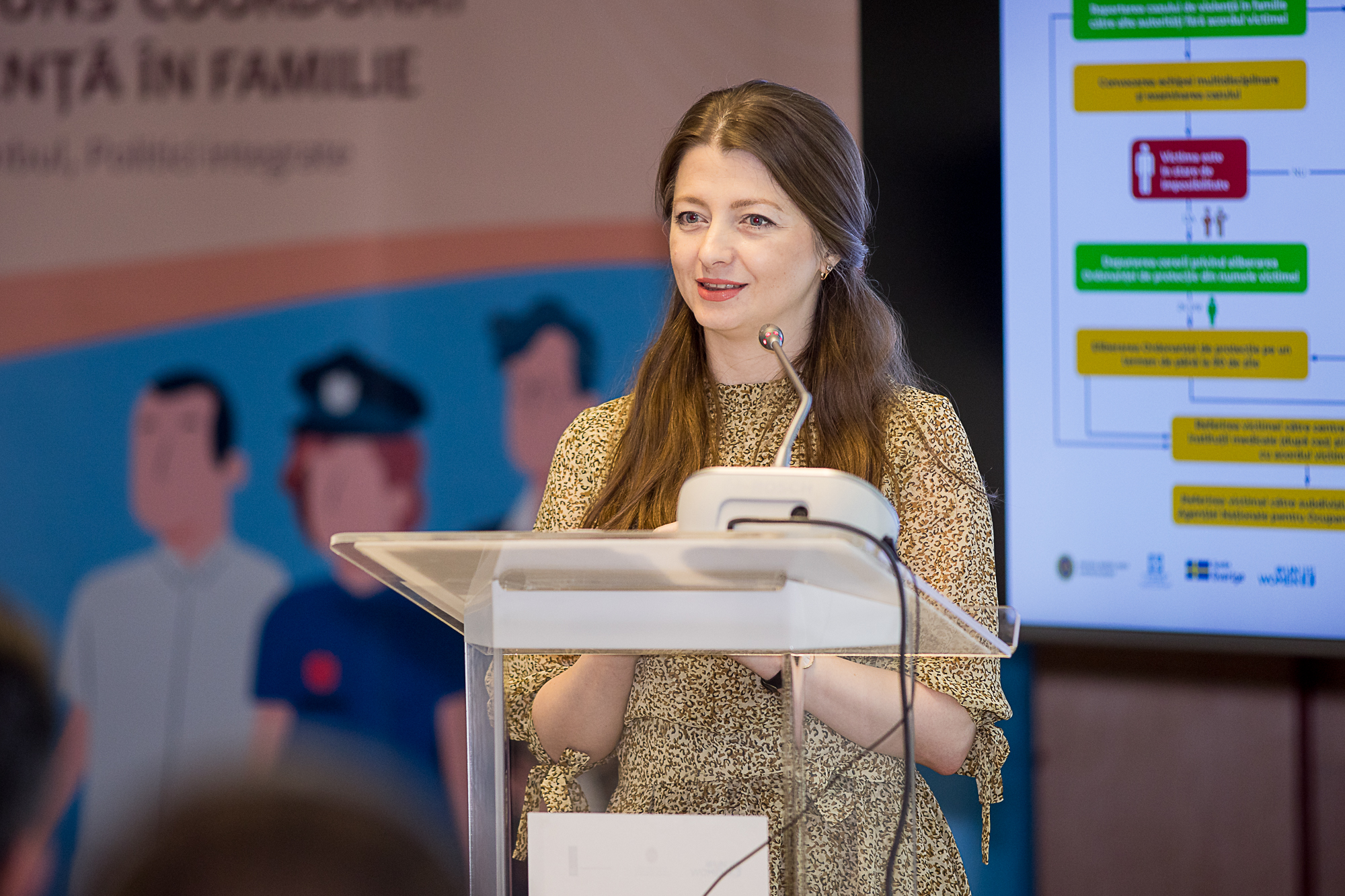
Photo Credit: Stela Dontu/ UN Women Moldova
The state secretary of the Ministry of Justice, Veronica Mihailov, expressed her belief in the efficiency of collaboration at the institutional level, which, in the long term, will contribute to increasing public trust in services and assistance provided by them. „Thanks to the ratification of the Istanbul Convention, each ministry has now concrete outlined objectives to improve the situation in their fields, in terms of preventing and combating domestic violence. The intersectoral cooperation mechanism will ensure consecutiveness and logic in joined efforts to respond to the phenomenon of domestic violence. We firmly believe that the procedures established in this interdepartmental act will ensure smooth cooperation at the institutional level, at the same time, making us more responsible. Also, from my point of view, in the long term, it will contribute to rebuilding trust in public services and public authorities.”
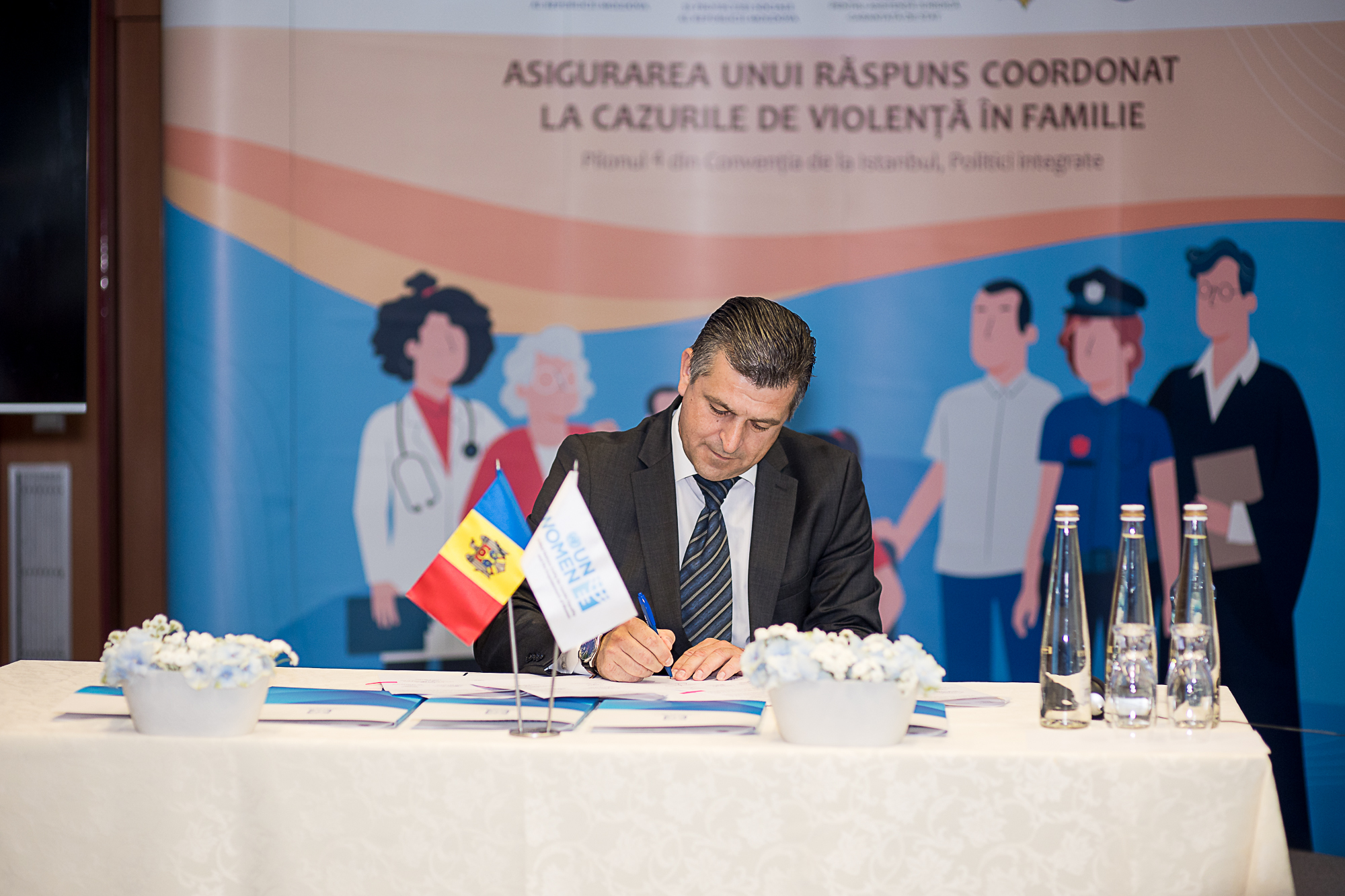
Photo Credit: Stela Dontu/ UN Women Moldova
The president of the National Council for State Guaranteed Legal Aid, Victor Zaharia, spoke about legal aid provided to victims of domestic violence and about the importance of ensuring capacity building for specialists from institutions in the field, in order to contribute to the good functioning of the mechanism. „We will keep providing urgent and ordinary qualified legal assistance to victims of domestic violence. These services are provided for free, regardless of the incomes of the victims. At the same time, it is important for us to make sure that specialists from involved institutions know, apply, and notice eventual challenges in implementing this agreement and the legislation in general. This will facilitate better cooperation from the operational point of view, especially when talking about districts and communities.”
Mariana Buruiana, the executive director of Women’s Law Center, mentioned the importance of the engagement of survivors of domestic violence in identifying concrete and swift actions to help victims. „This document represents, the result of an effort of many years, but also a multidimensional process to which contributed specialists in the field, the entire service community assisting and protecting victims of domestic violence, but also development partners, who provided necessary expertise. But the engagement of victims of domestic violence deserves a special mention. They contributed to the development of a document aiming at helping us respond promptly and efficiently to their needs. We believe that a very important step has been taken, as the intersectoral approach helps us find solutions.”
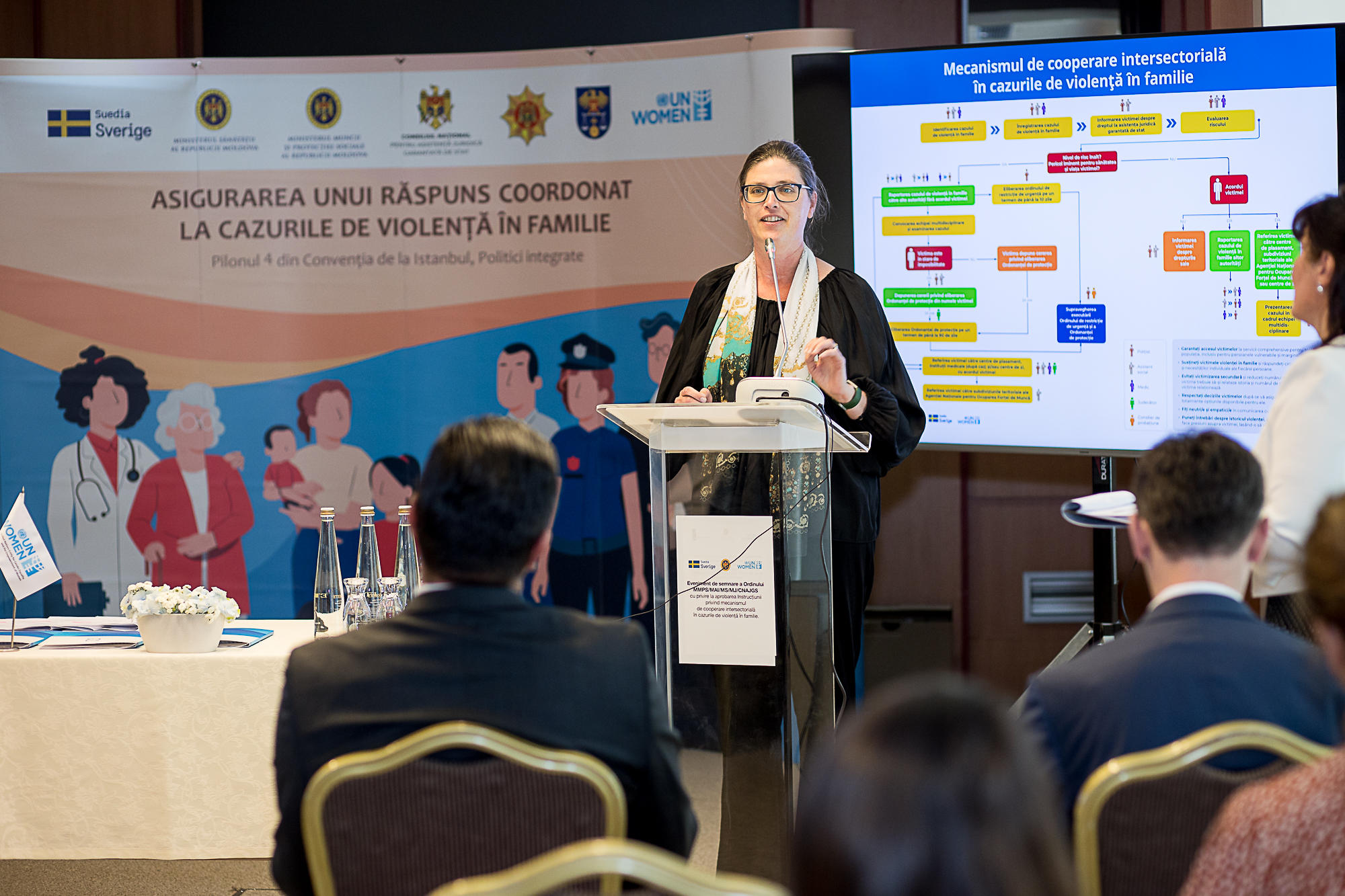
Photo Credit: Stela Dontu/ UN Women Moldova
In the context of the event, Her Excellency, Katarina Fried, ambassador of Sweden in Chisinau, spoke about the importance of joined efforts in state institutions, in order to combat domestic violence. “We appreciate that a number of state institutions are committed to working against violence and that from now on it is also `formalized` and the Intersectoral Mechanism is approved. Only having all the relevant institutions together and with joint efforts – a better and more coordinated response from key service providers will be ensured to all women and girls who are victims of domestic violence.”
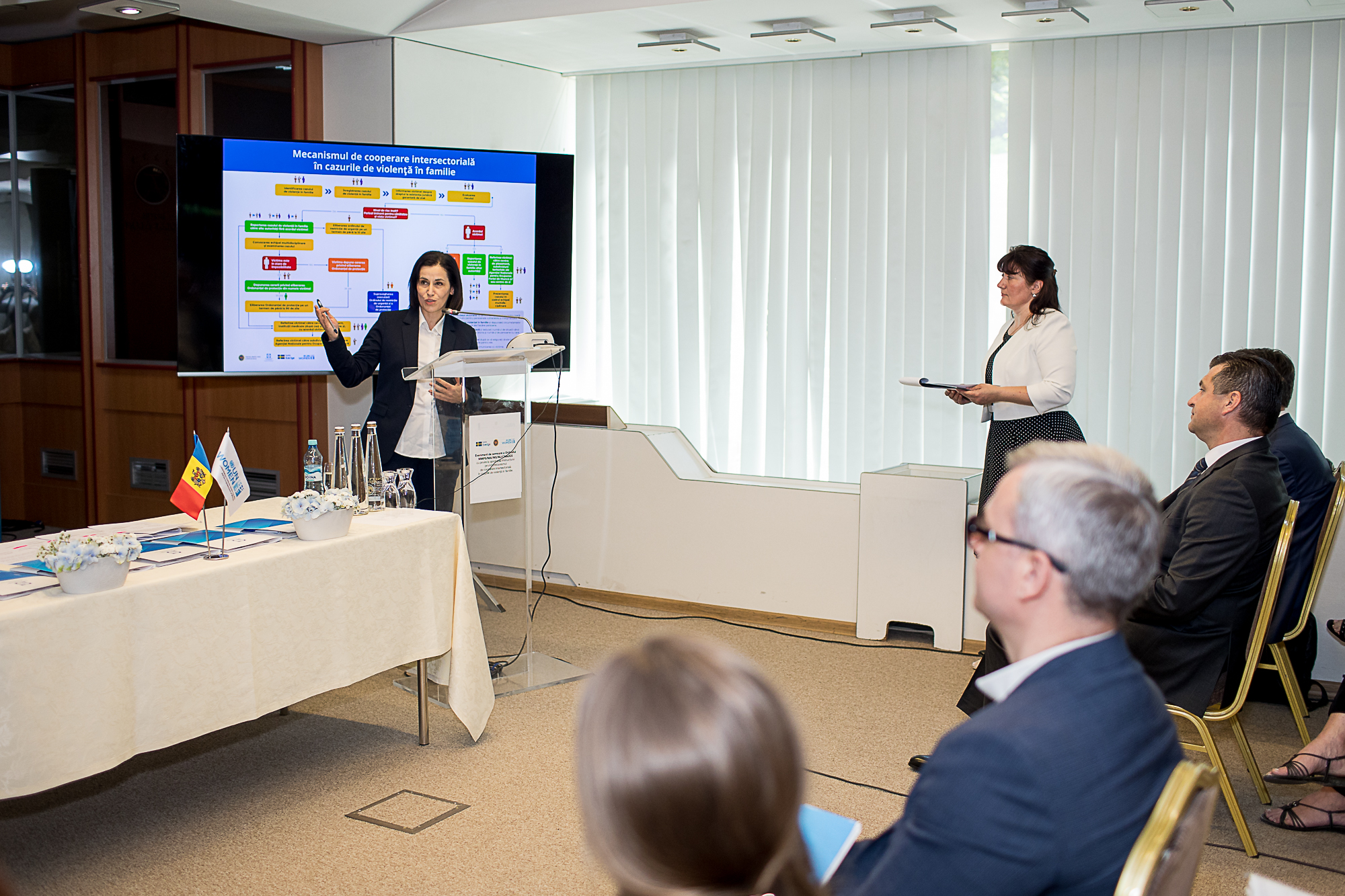
Photo Credit: Stela Dontu/ UN Women Moldova
Dominika Stojanoska, country representative UN Women Moldova, expressed her belief that, in light of the intersectoral cooperation mechanism, the provisions of the Istanbul Convention will be implemented accordingly, thus increasing the qualitative support provided to victims. “Coordination among different sectors and levels is critical in assisting women who survived violence to access effective, immediate, and consistent legal, health, and social services, as well as enhancing prevention work. The mechanism will build on the national efforts to implement qualitatively the Istanbul Convention, providing holistic, well-integrated support to victims that maximizes their safety and well-being.”
The intersectoral cooperation between institutions with competencies specified in the instruction will provide protection for victims and people indirectly affected by violence, offering, as well, specific solutions and appropriate services.